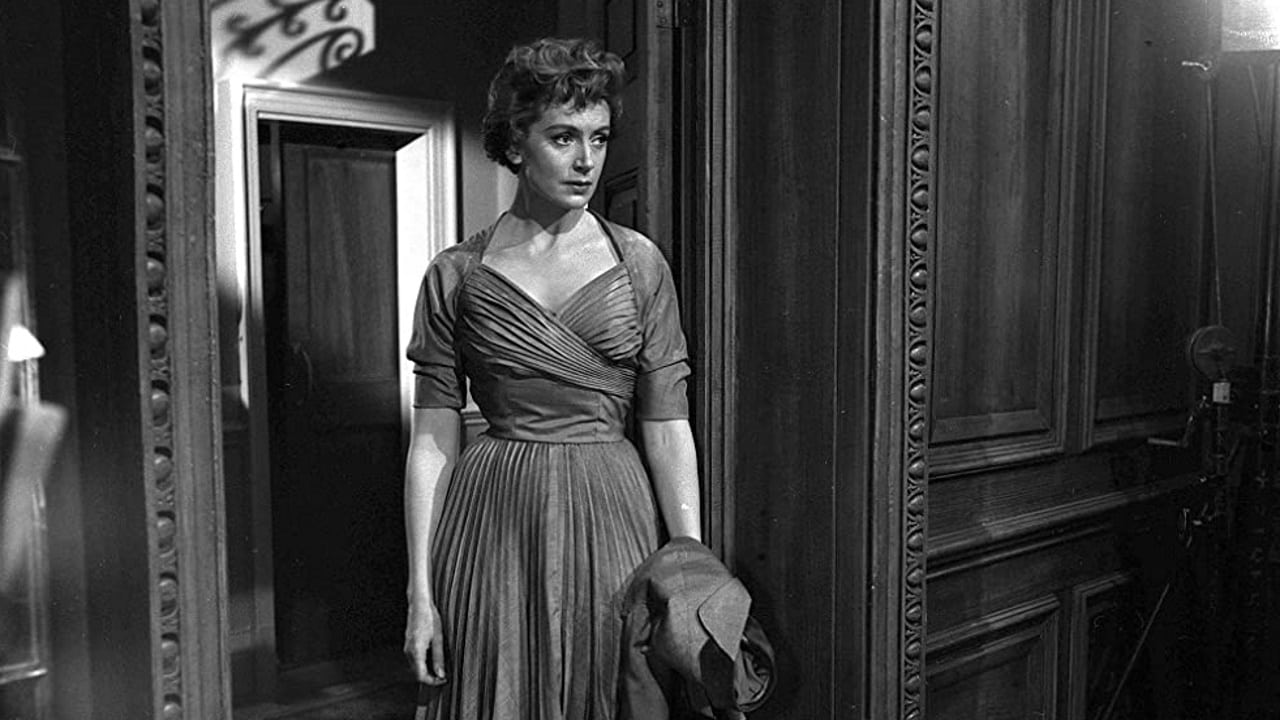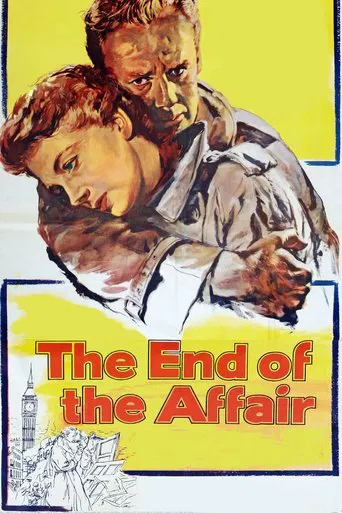Huievest
Instead, you get a movie that's enjoyable enough, but leaves you feeling like it could have been much, much more.
PiraBit
if their story seems completely bonkers, almost like a feverish work of fiction, you ain't heard nothing yet.
Aneesa Wardle
The story, direction, characters, and writing/dialogue is akin to taking a tranquilizer shot to the neck, but everything else was so well done.
Lidia Draper
Great example of an old-fashioned, pure-at-heart escapist event movie that doesn't pretend to be anything that it's not and has boat loads of fun being its own ludicrous self.
wes-connors
In London during World War II, wounded and honorably discharged soldier Van Johnson (as Maurice Bendrix) has resumed his writing career. At a party, Mr. Johnson encounters attractive Deborah Kerr (as Sarah) and asks her out to discuss a new book he's researching. Johnson is much more interested in Ms. Kerr than the book. She likes Johnson, too, and they are quickly copulating. There is a problem, however. Kerr is married to British civil servant Peter Cushing (as Henry Miles). During an air raid, Kerr and Johnson are having a tryst and Johnson is injured. Kerr finds Johnson dead and asks God to bring him back to life. In return, Kerr promises "The End of the Affair"...God answers Kerr's prayer, but doesn't tell Johnson why he's being dumped. He assumes she's found another man. The misunderstandings get more complicated after Johnson decides to hire private investigator John Mills (as Albert Parkis) to snoop on Kerr for Mr. Cushing...Original novelist Graham Greene's spiritual story receives good direction from Edward Dmytryk and gets some nice black-and-white scenes from Wilkie Cooper. The supporting cast is very good. At the time, Kerr received more praise from Johnson, who was thought miscast...In reality, they both act well in the roles. However, Kerr doesn't have any otherworldly appeal; she's lovely, but doesn't strike an erotic note. Johnson is likewise fine, but he doesn't compensate for Kerr with any animal magnetism. They don't get to know each other very well, so it must be all sex (which we don't see). It's also interesting that Johnson first sees Kerr kissing another man; we assume she's had a string of affairs, but are left misinformed. Although she writes very well, Kerr doesn't read books (only reviews) and is superstitions (doesn't walk under ladders). She is ultimately reads God well. The almighty is treated, herein, as an ambiguous off-screen character.****** The End of the Affair (2/24/55) Edward Dmytryk ~ Deborah Kerr, Van Johnson, Peter Cushing, John Mills
bkoganbing
Graham Greene's The End Of The Affair has Van Johnson coming over from America and Deborah Kerr returning to the United Kingdom for this British film with British supporting cast. Of all the Graham Greene work I've seen on the big and small screen this is the most overtly Catholic film I think was ever done.Kerr is married to dull and earnest Peter Cushing and one night at a party during World War II she meets American writer Johnson who after being invalided out of the service stayed on Great Britain. Johnson intrigues and excites Kerr and the two of them are soon in love. Then the guilt starts. Guilt on Kerr's part, jealousy on Johnson's. Poor Cushing for most of the film he hasn't a clue.After the beginning the two can never quite get together. Imagine Johnson who is the paramour hires a private detective to keep track of Kerr's movements to reassure Cushing. This is after things have cooled down. What a pair Johnson has. The detective is John Mills who I'm surprised is taking a small supporting role. He even takes along his young son Christopher Warbey for his surveillance work, the better that his subject doesn't think he's being followed. Besides he's breaking him into the business. The part must have intrigued Mills because he's the best one in the movie.I suppose being a Catholic really helps understand all the subtleties in the story. I much preferred that other affair film Johnson did with Jane Wyman, Miracle In The Rain. No guilt, just people in love.Cushing's character was odd. He was sweet but weak, the kind you feel sorry for. No grand passion was ever to be forthcoming with Kerr or anyone else he would have ever hooked up with.The End Of The Affair is all right. The remake done in 1999 with Ralph Fiennes in the Van Johnson role was more explicit. If you like Graham Greene you'll like both versions.
edwagreen
Imagine me saying that a Van Johnson, Deborah Kerr film was awful. It's true folks. This was one miserable film.In war ravaged England the two of them begin an affair only for Ms. Kerr to end it in thanks to the Lord when Maurice (Johnson) survives a bombing.The two of them engage in absolute endless talk. The film falls into a discussion regarding the lord and all other kinds of philosophy. Kerr gives an emotionally restrained performance in her usual sing-song diction.As Sarah in this film, there is no great chemical reaction between her and Maurice.As her suffering husband, an English civil servant, Peter Cushing is adequate but the dialogue is ridiculous.John Mills is real dead pan as an investigator.When a husband hires a detective to investigate a cheating wife, that can be believed. When a former lover does this, you have to wonder.Am wondering if Van Johnson was using this film as a pre-test to the much better "Miracle in the Rain" which occurred the following year. Two deaths coming during rainstorms is more than quite incidental.
bob the moo
An American writer meets the wife of a civil service acquaintance and quickly starts an affair with her. However Maurice is plagued with feelings of guilt and jealousy against Henry having Sarah, and bitterness that Sarah is being deceitful to her husband and perhaps, him too. After a bombing falls near their love nest, Sarah leaves and Maurice assumes that she had wished him dead. When Henry confides in him about his wife's possible infidelity, Maurice poses as her husband and hires a private detective to follow her and find out what she's doing.I have not seen the remake but was quite interested to see how a 1950's movie would manage to depict the illicit affair between Maurice and Sarah without breaking every moral code of the day. The answer is – with lots of talking. The film is significantly shorter than the modern version and had less controversy (or at least, does now) but it still manages to bring things out. The plot is pretty good but relies very heavily on the extended flashback/journal sequence to keep things going. The talk heavy feel is a little tiring but does work well – the characters' emotions are brought out well without profanity or nudity.I don't think Johnson fitted the role that well but he was still good. His inner bitterness and guilt came out well at points and he brings his complex character out well. Kerr is also good although her role is less difficult. She does have to carry the whole journal sequence near the end and she doesn't let the film dip. Cushing only has a few scenes but he is very good. He gives an English gent performance but eventually you can see the cracks as he tries to hold his feelings together.Overall this is a solid adaptation of the book that manages to bring out the subject matter without the sexual excess of the modern version. While it is a little heavy on dialogue at times, the emotions come out with all the stilted control of the period and it works quite well as a subversive melodrama.

